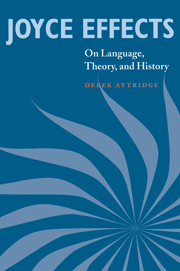Book contents
- Frontmatter
- Contents
- Acknowledgments
- References and abbreviations
- Preface
- Introduction: On being a Joycean
- Chapter 1 Deconstructive criticism of Joyce
- Chapter 2 Popular Joyce?
- Chapter 3 Touching ‘Clay’: reference and reality in Dubliners
- Chapter 4 Joyce and the ideology of character
- Chapter 5 ‘Suck was a queer word’: language, sex, and the remainder in A Portrait of the Artist as a Young Man
- Chapter 6 Joyce, Jameson, and the text of history
- Chapter 7 Wakean history: not yet
- Chapter 8 Molly's flow: the writing of ‘Penelope’ and the question of women's language
- Chapter 9 The postmodernity of Joyce: chance, coincidence, and the reader
- Chapter 10 Countlessness of livestories: narrativity in Finnegans Wake
- Chapter 11 Finnegans awake, or the dream of interpretation
- Chapter 12 The Wake's confounded language
- Chapter 13 Envoi: judging Joyce
- Works cited
- Index
Chapter 13 - Envoi: judging Joyce
Published online by Cambridge University Press: 22 September 2009
- Frontmatter
- Contents
- Acknowledgments
- References and abbreviations
- Preface
- Introduction: On being a Joycean
- Chapter 1 Deconstructive criticism of Joyce
- Chapter 2 Popular Joyce?
- Chapter 3 Touching ‘Clay’: reference and reality in Dubliners
- Chapter 4 Joyce and the ideology of character
- Chapter 5 ‘Suck was a queer word’: language, sex, and the remainder in A Portrait of the Artist as a Young Man
- Chapter 6 Joyce, Jameson, and the text of history
- Chapter 7 Wakean history: not yet
- Chapter 8 Molly's flow: the writing of ‘Penelope’ and the question of women's language
- Chapter 9 The postmodernity of Joyce: chance, coincidence, and the reader
- Chapter 10 Countlessness of livestories: narrativity in Finnegans Wake
- Chapter 11 Finnegans awake, or the dream of interpretation
- Chapter 12 The Wake's confounded language
- Chapter 13 Envoi: judging Joyce
- Works cited
- Index
Summary
A COMMITMENT TO JOYCE
Looking back over these various attempts during the past fifteen years to register the eeffect, or rather effects, of Joyce on my own thinking and on literary theory and literary culture in the latter part of the twentieth century, I am struck by the unfailing basis on which they all rest: the unquestioned assumption that Joyce's writing is to be enjoyed, admired, and learned from rather than weighed in evaluative scales and pronounced good, bad, or a mixture of the two. This is in part no doubt a matter of personality: a tendency, which I have been aware of in other areas of my experience, to plump for something (a poem, a book, an author, an institution, a country) – often after an extended process of examination and appraisal – in such a way as to give it the benefit of the doubt in further judgements, and to interpret uncertain evidence in its favour at least until negative indications accumulate beyond any denying. (I should make it clear that, one's judgements of people resting on another basis than one's judgements of books, my predilection in favour of Joyce's writing does not extend to his character as we receive in it biographical commentary, a character in which there is clearly much to dislike – though I see little point in spending one's time finding fault with Joyce's behaviour or his attitudes.
- Type
- Chapter
- Information
- Joyce EffectsOn Language, Theory, and History, pp. 163 - 188Publisher: Cambridge University PressPrint publication year: 2000



